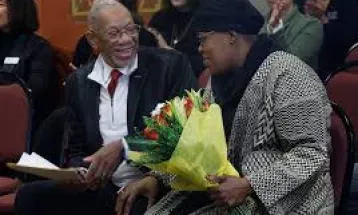
Academic Sues Makers of 'The Lost King' Over Portrayalq
Richard Taylor, a former deputy registrar at the University of Leicester, has filed a lawsuit against the creators of the 2022 film "The Lost King," claiming that his character was misrepresented as "dismissive, patronizing, and misogynistic."
In the film, Taylor is portrayed by Lee Ingleby in a story about the discovery of Richard III's remains in a Leicester car park in 2012, more than five centuries after his death. At a recent hearing in London, Taylor's lawyer, William Bennett KC, argued that his client was depicted as "devious," "weasel-like," and a "suited bean-counter."
Taylor, who left the university in 2013, is shown in the film as being hostile toward amateur historian Philippa Langley, played by Sally Hawkins, who leads the excavation but is marginalized by the academic community when they try to take credit for the discovery.
Langley's husband is played by Steve Coogan, who co-wrote the script with Jeff Pope. The film was directed by Stephen Frears, who previously collaborated with Coogan and Pope on the 2013 film "Philomena." Taylor is suing the filmmakers, as well as production company Baby Cow and distributors Pathe.
In his written submissions, Bennett stated: "The relevant context is the good versus bad narrative, which runs through the film. Ms. Langley is portrayed as the gutsy underdog heroine struggling against opposition, and the claimant as the arrogant villain. He not only takes steps to make sure that people do not know about her role, but takes the credit, which was rightfully hers, for himself and the university."
Bennett went on to say that Taylor was depicted as "mocking" Richard III's disability and "linking physical deformity with wickedness or moral failings."
In response, Andrew Caldecott KC, representing Baby Cow and Pathe, argued that the film was not intended to be a documentary but a dramatization of events. He also contended that Taylor was not portrayed as a misogynist and that his concern was about Langley's amateur status and lack of historical expertise, not her gender.
Caldecott added that Taylor was not shown as mocking Richard III's disability, "and certainly not mocking disabled people in general."
The University of Leicester has also disputed aspects of the film, including Taylor's portrayal. In a statement, the university said that the film "does not in any way resemble the reality during this period ... Our records point to a colleague engaging constructively, collegiately, fairly, and professionally throughout the project."
Taylor, who is now the chief operating officer at Loughborough University, has said that he was portrayed in the film as "a bullying, cynical, double-crossing, devious manipulator," and that his actions in the film "start to get into the realm of defamation."
Despite the controversy, the film-makers have defended their portrayal of events, saying that Philippa Langley's recollection of events, as corroborated by their research, differs significantly from the university's version of events.
In a press release about the university's growth, pro-vice chancellor Philip Baker said: "We were involved with the successful unearthing, identification, and reinterment of Richard III, and now we're leading the Dickens Code project to decipher the author's shorthand texts."
Taylor's biography on Loughborough University's website states that he "was one of the prime leaders behind the successful search for King Richard III's remains."
As the legal battle continues, it remains to be seen how the film's portrayal of Taylor and the University of Leicester will be resolved.




















